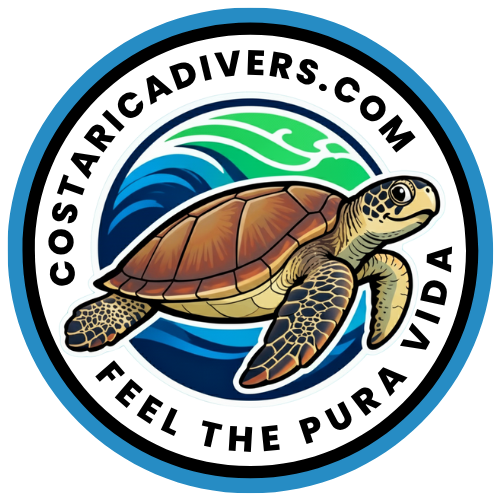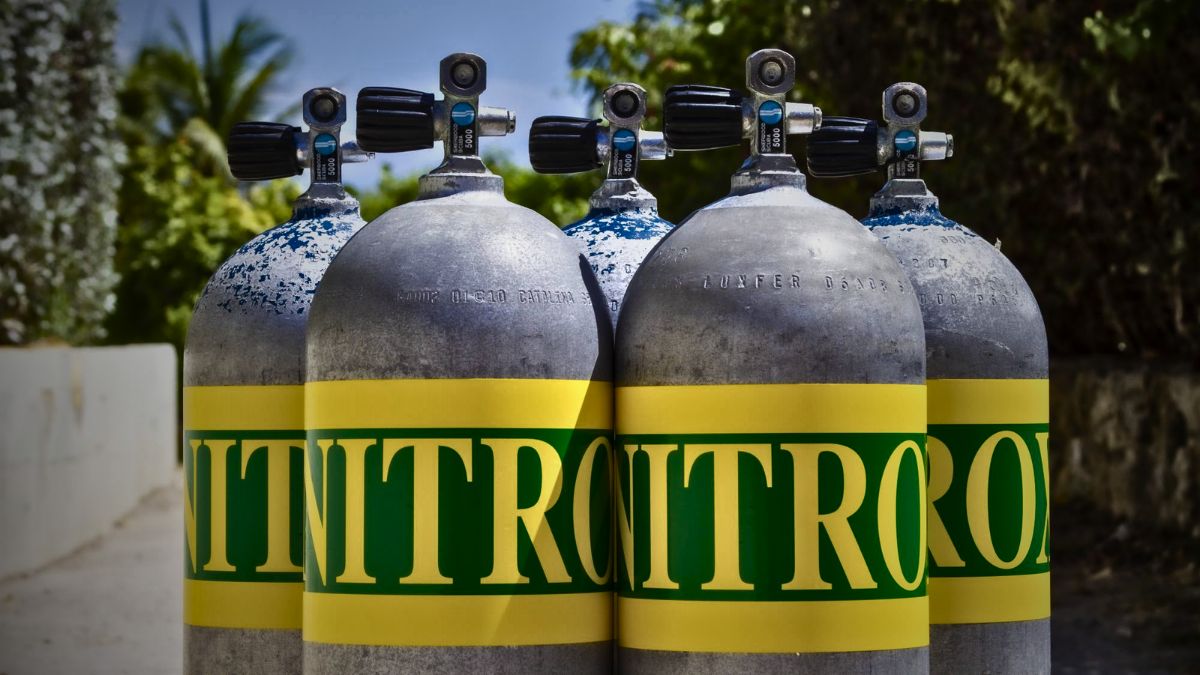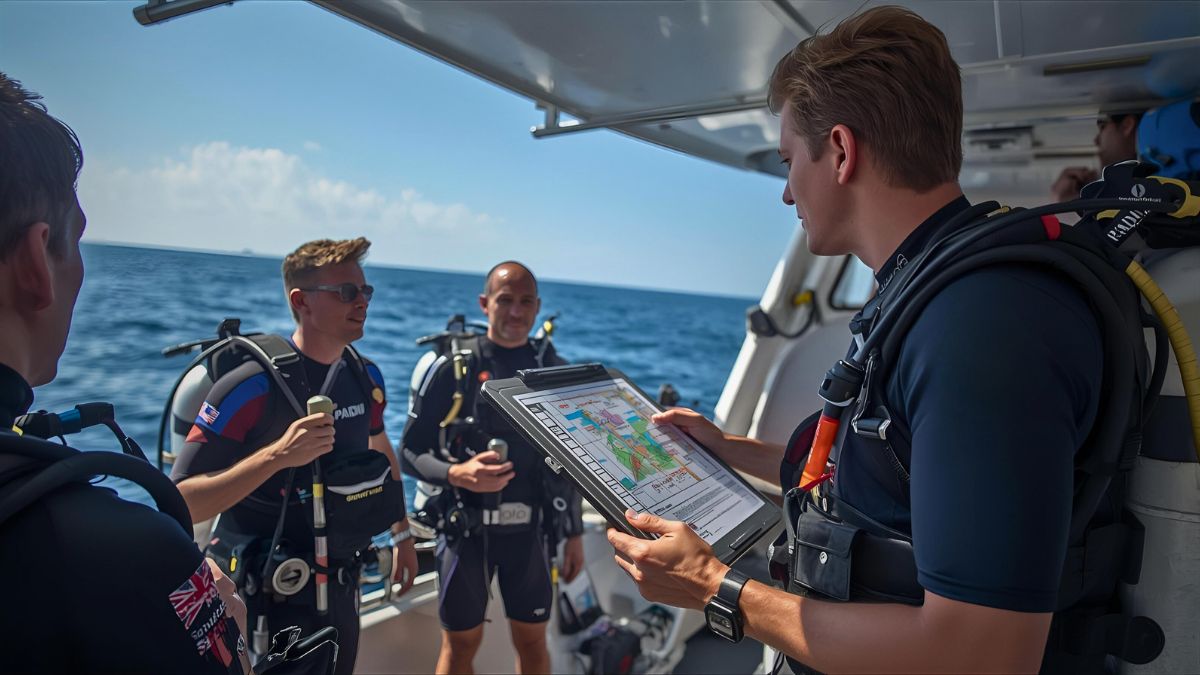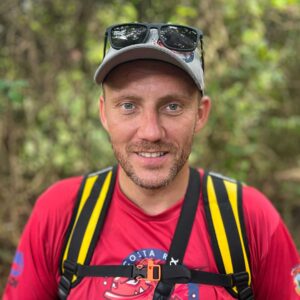Have you ever wondered what lies beneath the ocean’s surface? Maybe you’ve snorkeled and caught glimpses of colorful fish, or watched documentaries about coral reefs and shipwrecks. If you’re curious about how to start diving and explore the underwater world for yourself, you’ve landed in the right place.
I run a PADI-authorized dive center in Costa Rica, where I’ve taught hundreds of beginners to dive. Some were nervous about breathing underwater. Others worried they weren’t fit enough or couldn’t swim well. But almost anyone can become a diver with proper training and guidance.
This guide covers everything you need to know about learning to dive: the basic steps, safety considerations, costs, and what happens during your certification course. By the end, you’ll know exactly how to start diving and whether this adventure suits you.
Why Should I Learn to Dive?
Learning to dive gives you access to 70% of our planet that most people never see. Imagine floating weightlessly above a coral reef, watching sea turtles glide past, or exploring a sunken shipwreck.
What Makes Diving Different from Snorkeling?
Diving offers freedom and peace that’s difficult to find anywhere else. While snorkeling limits you to the surface, diving lets you descend into the blue, hover effortlessly at any depth, and spend extended time exploring underwater environments.
It’s more than sightseeing, though. Diving challenges you physically and mentally. You learn new skills, build confidence, and join a global community of underwater explorers.
What Will I See Underwater?
In warm tropical waters like ours in Costa Rica, you’ll encounter incredible marine life: manta rays, dolphins, sharks, colorful reef fish, sometimes even whales. The underwater world is vibrant, alive, and absolutely worth discovering.
Many students tell me that getting certified changed how they view the world. Once you’re a diver, every coastline becomes an invitation.
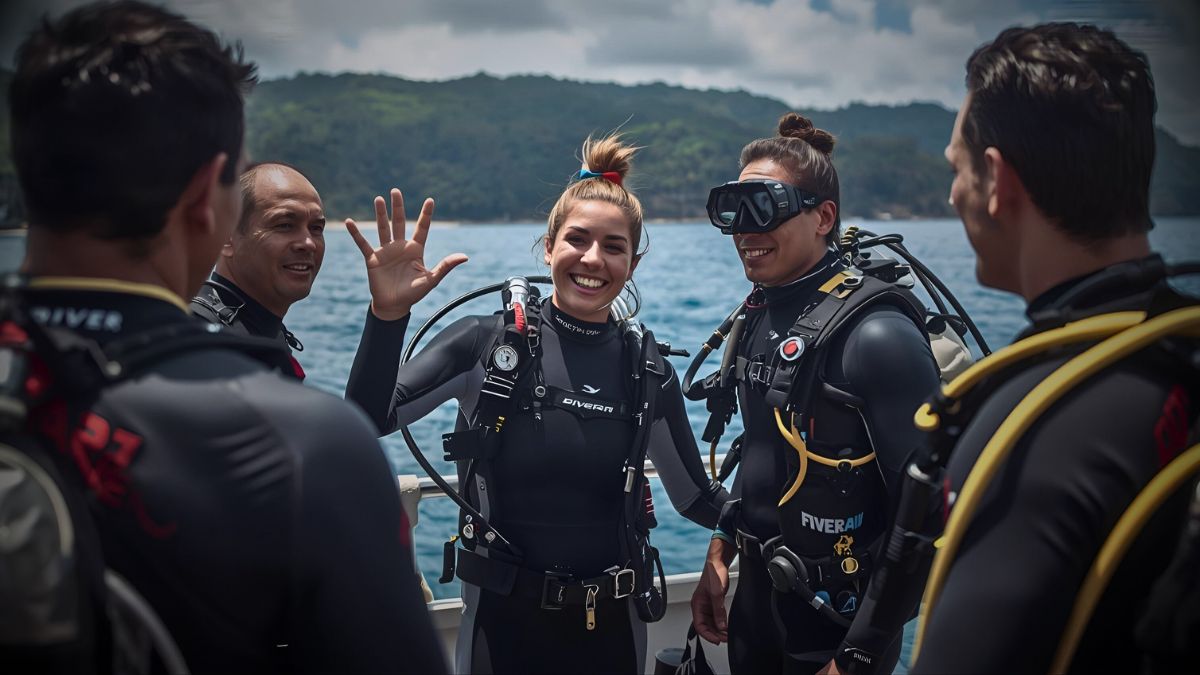
Is Scuba Diving Safe?
Safety is the number one concern when people ask how to start diving, and that’s completely normal.
How Dangerous is Scuba Diving Really?
Scuba diving is very safe when you follow proper training and procedures. Actually, diving has a lower injury rate than many popular sports like skiing, football, or cycling.
Did you know? According to DAN (Divers Alert Network), recreational diving has an incident rate of less than 1 per 10,000 dives. That makes it statistically safer than many everyday activities.
What Makes Diving Safe?
The key is education. During your diving course, you learn equipment operation, air management, buoyancy control, and how to handle situations underwater. You practice these skills repeatedly in controlled environments before ever diving in open water.
Modern diving equipment is incredibly reliable. Your gear includes backup breathing systems, and you always dive with a buddy who can help if needed. Your instructor stays with you throughout training dives.
Can Diving Be Dangerous?
Yes, diving does involve risk. You’re entering an environment where humans don’t naturally belong, which is why proper training matters. Never try to teach yourself or take shortcuts. The basic diving course exists for good reason, giving you knowledge and skills to dive safely for life.
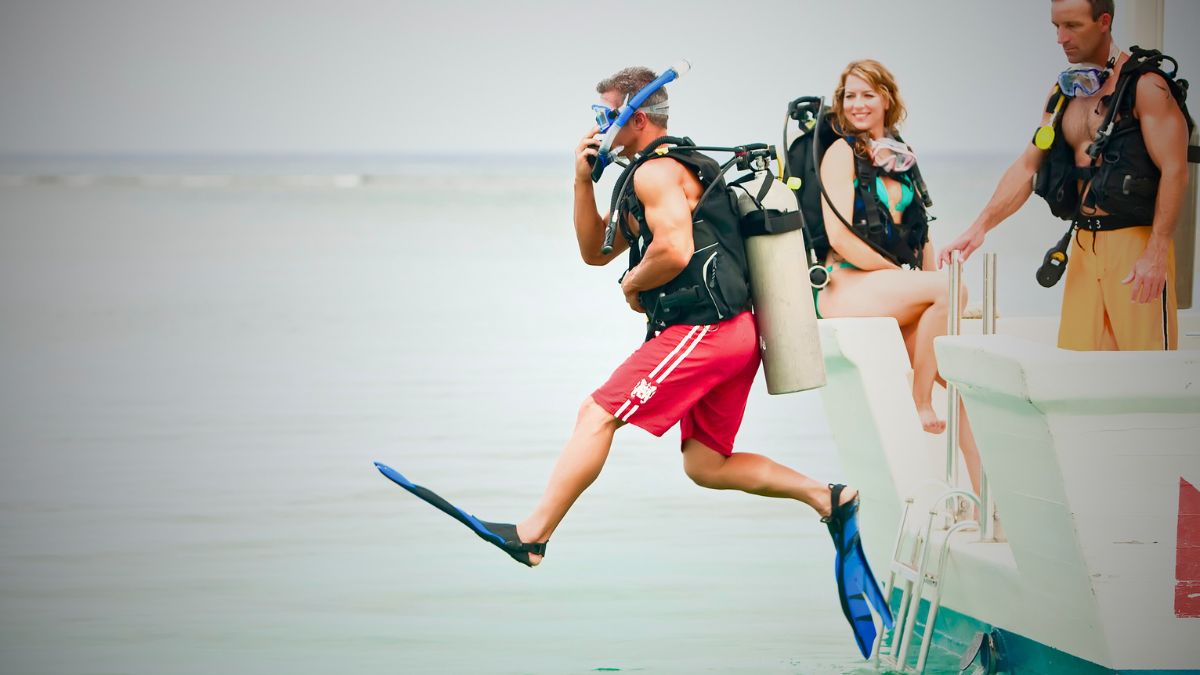
Who Can Learn to Dive?
One of the best things about diving? It’s accessible to almost everyone.
What Age Can You Start Diving?
Children can start diving at 10 years old with a Junior Open Water certification, limited to shallower depths (12 meters or 40 feet) and requiring a certified adult buddy. At 15, they can upgrade to full certification with no restrictions.
There’s no upper age limit. I’ve certified people in their 60s and 70s who became passionate divers. Health and fitness matter more than age.
Do I Need to Know How to Swim to Scuba Dive?
You don’t need Olympic-level swimming skills, but water comfort is essential.
What Are the Swimming Requirements for Diving?
Most certification courses require:
- Swimming 200 meters (or 300 meters with mask, fins, and snorkel) without stopping
- Floating or treading water for 10 minutes without assistance
Notice there’s no time limit on the swim. Use any stroke, take it slowly, rest by floating. The goal is demonstrating water comfort, not speed.
What Health Conditions Prevent You from Diving?
Certain medical conditions require doctor approval before diving:
- Heart problems or high blood pressure
- Respiratory issues like asthma
- Ear or sinus conditions
- Epilepsy or seizure disorders
- Recent surgeries
Before starting, you’ll complete a medical questionnaire. Any “yes” answers need clearance from a doctor familiar with diving medicine. This protects your safety.
Do You Need to Be Fit to Scuba Dive?
Diving requires moderate fitness. You’ll carry equipment (though it feels lighter in water), swim against mild currents, and manage your body position underwater.
Athletic ability isn’t necessary, but you should handle walking reasonable distances and light physical activity.
Can People With Disabilities Scuba Dive?
Absolutely. Adaptive techniques and specialized training exist for individuals with paraplegia, amputations, and other challenges. If you have concerns about limitations, talk to a certified instructor for individual assessment.
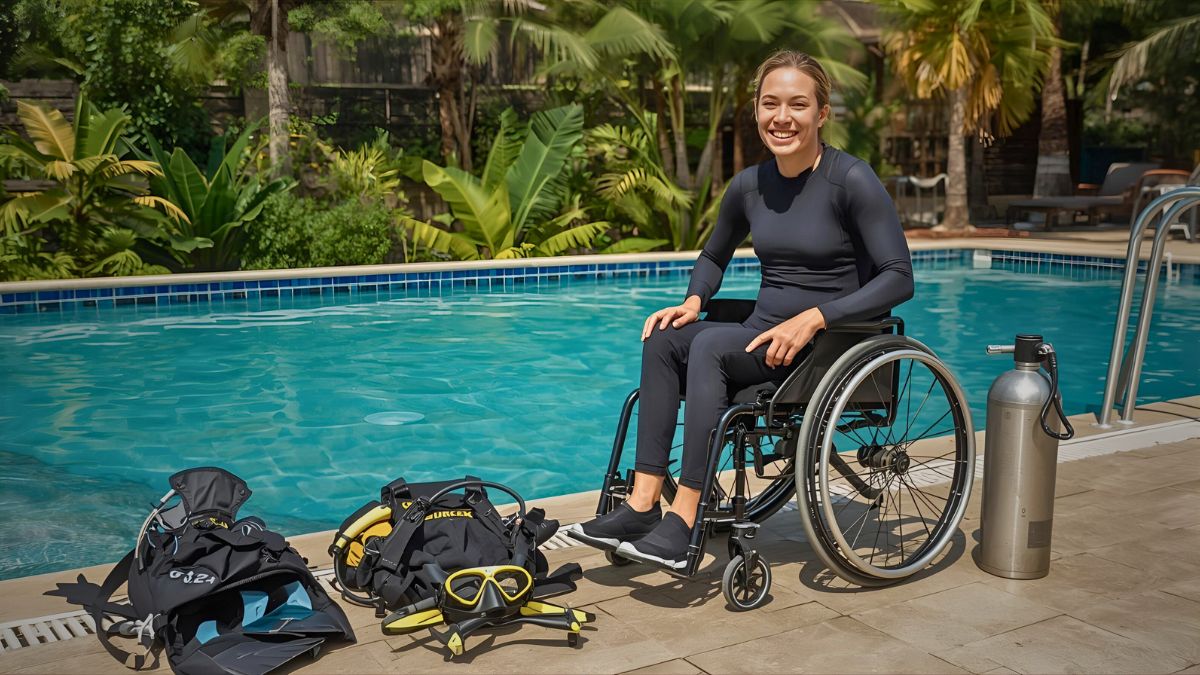
How to Start Diving: Step-by-Step Process
The practical details of how to start diving and earn certification are straightforward. I’ll walk you through each stage.
Step 1: How Do I Choose a Dive Center?
This is your most important decision. The instructor teaches you, not the logo on your certification card.
What Should I Look for in a Dive Center?
When evaluating dive centers, consider:
- Instructor qualifications and experience: Teaching duration? Good reviews?
- Class size: Smaller groups provide more personal attention
- Equipment quality: Well-maintained gear affects safety and comfort
- Location: Local learning or vacation certification?
Ask questions freely. Good dive centers happily discuss teaching approaches, safety records, and what differentiates them.
How Do I Know if an Instructor is Good?
Look for patience, clear communication, and genuine teaching passion. You’ll spend several days together, so personality matters. I wrote a detailed guide about checking scuba instructor qualifications if you want deeper information.
Step 2: What Diving Course Should I Take as a Beginner?
For complete beginners, two main options exist:
What is Discover Scuba Diving?
This trial experience isn’t full certification. You learn basic skills and complete one or two dives under direct instructor supervision.
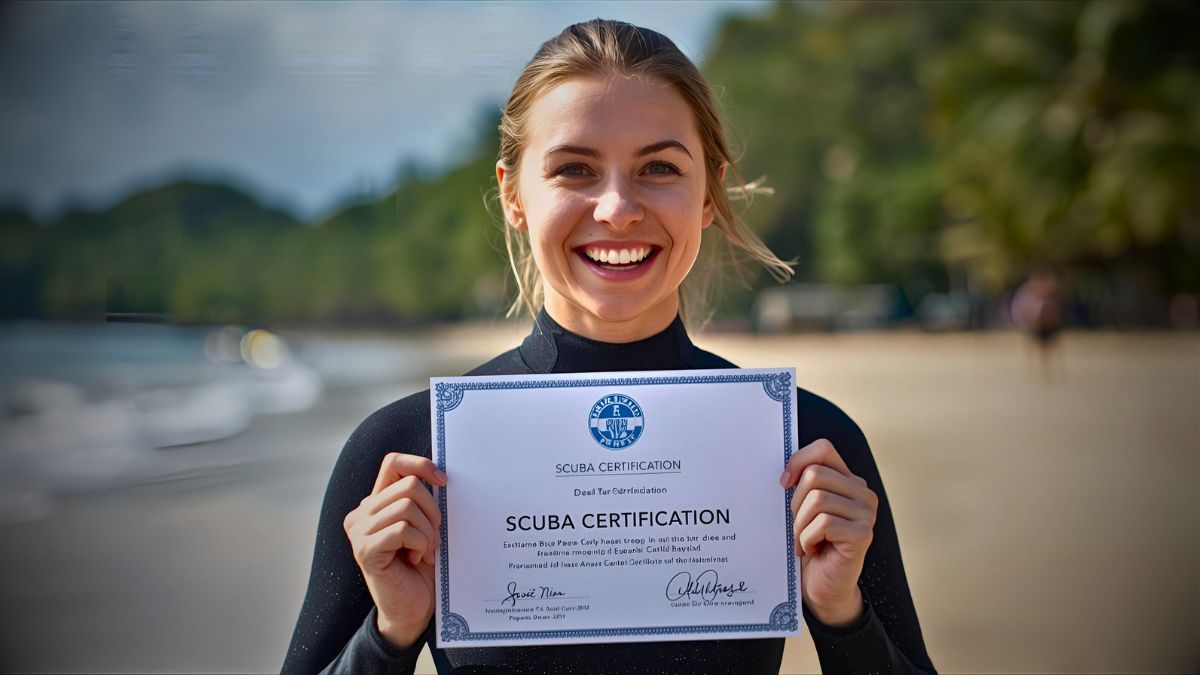
What is Open Water Diver Certification?
This is full certification. The basic certified diving course makes you an independent diver. After completion, you can dive anywhere worldwide (up to 18 meters or 60 feet) with a certified buddy. Valid for life.
Almost everyone starts with Open Water. It’s globally recognized, opens doors to advanced training, and provides freedom to explore dive sites worldwide.
PADI vs SSI vs SDI: Which is Best?
You’ll also choose a certifying organization. The most common are PADI, SSI, and SDI. Honestly, they’re all excellent. Differences are minimal, and dive shops worldwide accept all major certifications.
I’ve written more about diving organizations and their differences if you’re curious.
Step 3: What is the Theory Part of Diving?
Every diving course starts with theory. Not boring classroom lectures, though (unless you choose that option).
What Do You Learn in Diving Theory?
You’ll study five main areas:
- Diving equipment and operation
- Physics of diving (pressure, air consumption, buoyancy)
- Physiology (body responses underwater)
- Dive planning and safety procedures
- The underwater environment
Can I Learn Diving Theory Online?
Most dive centers now offer e-learning: study at home on your computer or tablet. Watch videos, read materials, complete quizzes at your own pace. Incredibly convenient for busy schedules.
Some centers still offer traditional classroom sessions if you prefer face-to-face learning. Both methods cover identical material.
How Long Does the Theory Take?
Knowledge portions typically take 12 to 15 hours total. Spread this over several days or weeks. At the end, you’ll take a final exam. The passing score is 75%, and your instructor reviews everything beforehand.
Step 4: What Happens in Pool Training?
This is where diving gets real. You put on scuba equipment for the first time and take your first breaths underwater.
Where Does Pool Training Take Place?
Confined water training happens in swimming pools or calm, shallow water. The controlled environment lets you focus on learning without worrying about currents, waves, or deep water.
What Skills Will I Learn in the Pool?
You’ll complete five pool sessions, each teaching specific skills:
- Assembling and wearing scuba equipment
- Breathing from a regulator underwater
- Clearing water from your mask
- Controlling buoyancy (floating at different depths)
- Emergency procedures like air sharing with your buddy
- Proper finning techniques and underwater movement
Your instructor demonstrates each skill first, then helps you practice until comfortable.
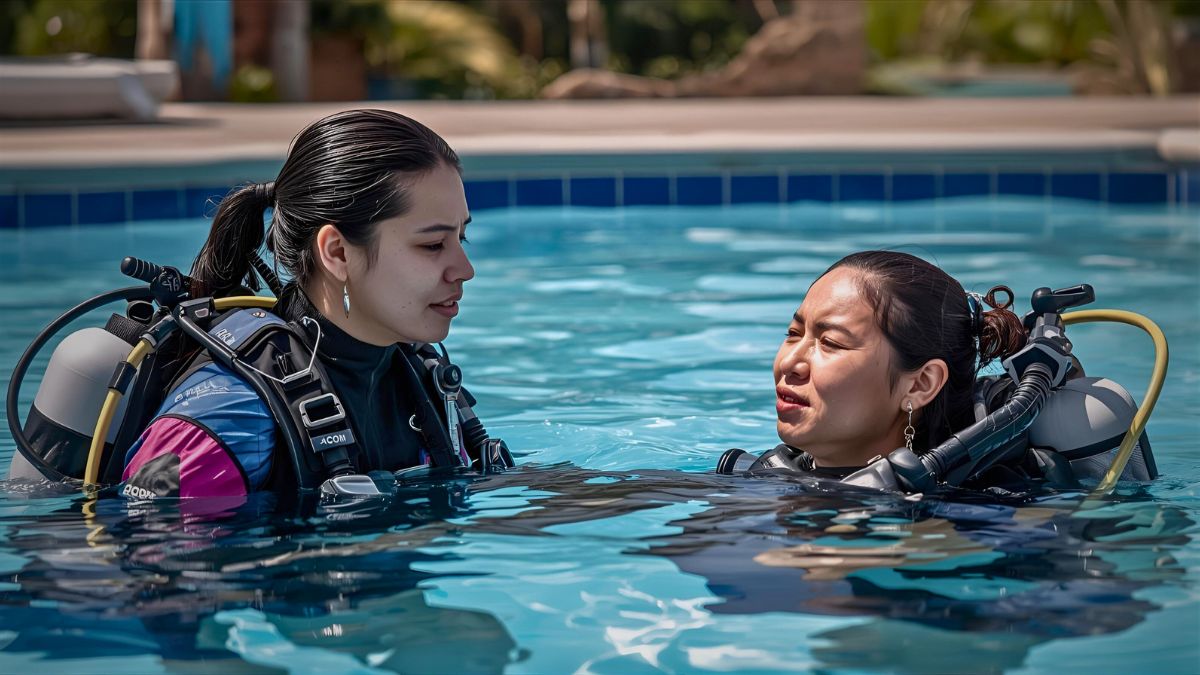
Is Breathing Underwater Scary?
I tell students it’s okay to feel awkward initially. Breathing underwater is unnatural for humans. Your brain needs time accepting that you can actually breathe with your face submerged. By pool sessions’ end, what felt weird becomes second nature.
How Long Does Pool Training Take?
Pool training usually takes two or three days, depending on course scheduling. Some dive centers offer intensive programs for quick completion. Others spread sessions over weekends.
Step 5: What Are Open Water Dives?
Once you’ve mastered pool skills, the best part arrives: diving in the ocean, a lake, or another natural body of water.
How Many Open Water Dives Do I Need?
You’ll complete four open water dives, typically over two days. These dives gradually increase depth:
- Dives 1: Maximum 12 meters (40 feet)
- Dives 2, 3 and 4: Maximum 18 meters (60 feet)
What Do You Do During Open Water Dives?
During each dive, you’ll:
- Complete a pre-dive safety check with your buddy
- Review the dive plan (depth, time, what you’ll see)
- Practice skills learned in the pool
- Explore the dive site and observe marine life
- Monitor air supply and bottom time
Your instructor stays with you constantly. On the final dive, you plan and execute more independently (still supervised) to demonstrate readiness.
What Does Your First Ocean Dive Feel Like?
These open water dives are unforgettable. The first time you descend into blue water and realize you’re breathing normally, exploring freely, surrounded by fish… it’s magical. This is why people fall in love with diving.
Fun fact: Your first open water dive will probably feel shorter than reality. Most students are so amazed that 30 to 40 minutes underwater feels like 10!
Step 6: How Do I Get My Diving Certification?
After completing all course requirements, you receive your certification card (usually digital now). Congratulations! You’re a certified diver.
What Can I Do With Open Water Certification?
Your Open Water certification allows you to:
- Dive anywhere worldwide up to 18 meters (60 feet)
- Rent diving equipment
- Book dive trips and liveaboards
- Continue training with advanced courses
Does Diving Certification Expire?
No. Certification never expires. Once certified, always certified. If you take a long break, refresher courses brush up skills, but your license remains valid forever.
What Equipment Do I Need for Diving?
One common misconception: you need expensive equipment before learning to dive. Not true.
What Equipment Does the Dive Center Provide?
During your course, dive centers provide all major equipment:
- Wetsuit or drysuit: Keeps you warm, protects skin
- BCD (Buoyancy Control Device): Vest holding your tank, helps control depth
- Regulator: Device you breathe from, connected to air tank
- Air tank: Contains compressed air for underwater breathing
- Dive computer or pressure gauge: Monitors depth, time, air supply
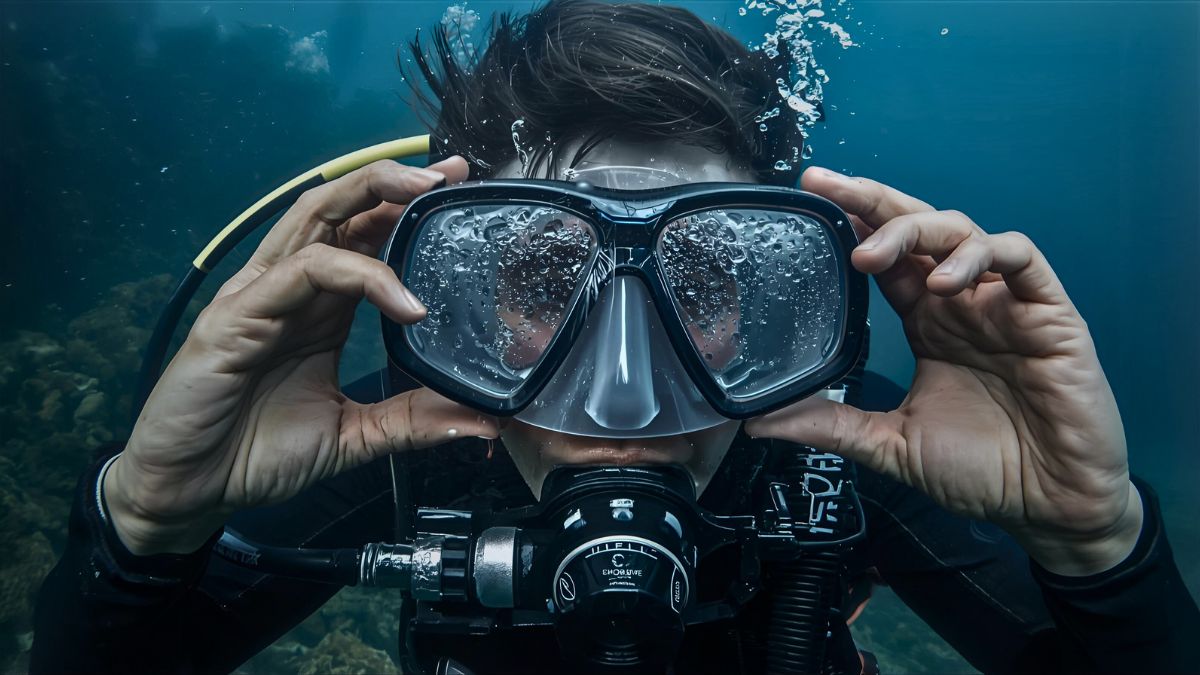
How Long Does It Take to Get Certified?
Time commitment is a common question when people ask how to start diving.
What is the Fastest Way to Get Certified?
The fastest route: an intensive three to four day course:
- Day 1: Theory completion (if e-learning finished beforehand) and pool sessions
- Day 2: More pool sessions and first two open water dives
- Day 3: Final two open water dives and certification
This intensive format works well for vacation learning.
Can I Spread Out My Diving Course?
Many prefer spreading courses over one to two weeks:
- Complete theory at home via e-learning (self-paced)
- Attend pool sessions on weekends or evenings
- Schedule open water dives when weather and schedules align
You have up to one year completing certification after starting. This flexibility allows comfortable-paced learning without rushing.
Can I Start My Course in One Place and Finish in Another?
Yes. If you start at home but want vacation finishing (or vice versa), referrals work. Complete parts with one instructor, finish remaining portions with another certified instructor anywhere worldwide.
How Much Does a Diving Course Cost?
I’ll be honest: diving courses aren’t cheap, but they’re worth every penny.
What Does a Scuba Diving Course Cost?
You’re paying for professional instruction, equipment use, boat trips, and lifetime certification.
Prices vary significantly based on:
- Location (tropical destinations vs. local diving)
- Class size (private vs. group)
- Inclusions (equipment, materials, boat fees)
- Course format (intensive vs. spread out)
In Costa Rica, expect $400 to $750 for complete Open Water courses. That typically includes everything: theory materials, equipment rental, pool sessions, open water dives, boat trips, certification fees.
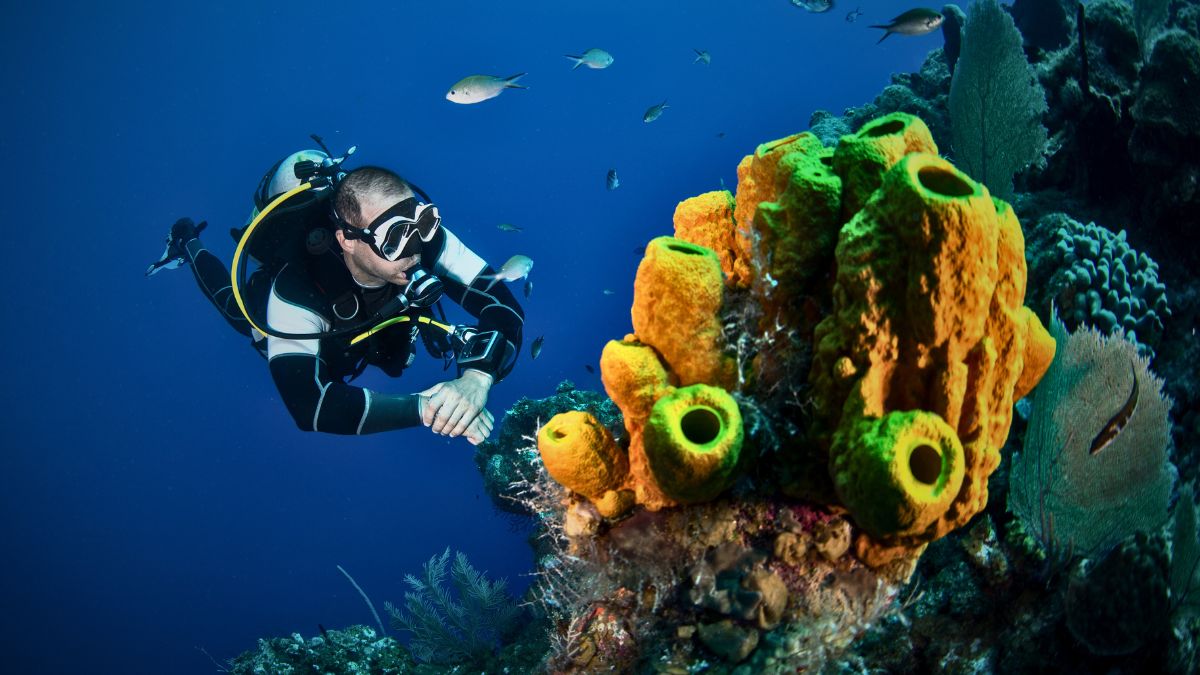
Why Are Some Courses Cheaper Than Others?
Some dive centers advertise lower prices but charge separately for materials, equipment, or boat fees. Always ask what’s included in quoted prices for accurate comparison.
Is Learning to Dive Worth the Cost?
Compare to other activities:
- Full-day surfing lessons cost about the same
- Three hours private golf instruction runs similar prices
- It’s less than many adventure sports certifications
Plus, you’re not paying for one-time experiences. You’re learning a skill opening worldwide diving opportunities for life. Incredible value.
How Can I Save Money on Diving Courses?
Budgeting tips:
- Check if theory materials are included or extra
- Ask about equipment rental costs if not included
- Consider location (local learning might be cheaper than resorts)
- Look for package deals when traveling (diving plus accommodation)
What Are Good Ways to Remember My Dives?
Here are appropriate ways:
Should I Keep a Dive Logbook?
A logbook is a dive diary recording every dive: location, depth, time, water conditions, what you saw. You can also note feelings, funny moments, or special encounters.
Over time, your logbook becomes a cherished record of underwater adventures. I wrote more about why dive logbooks are valuable.
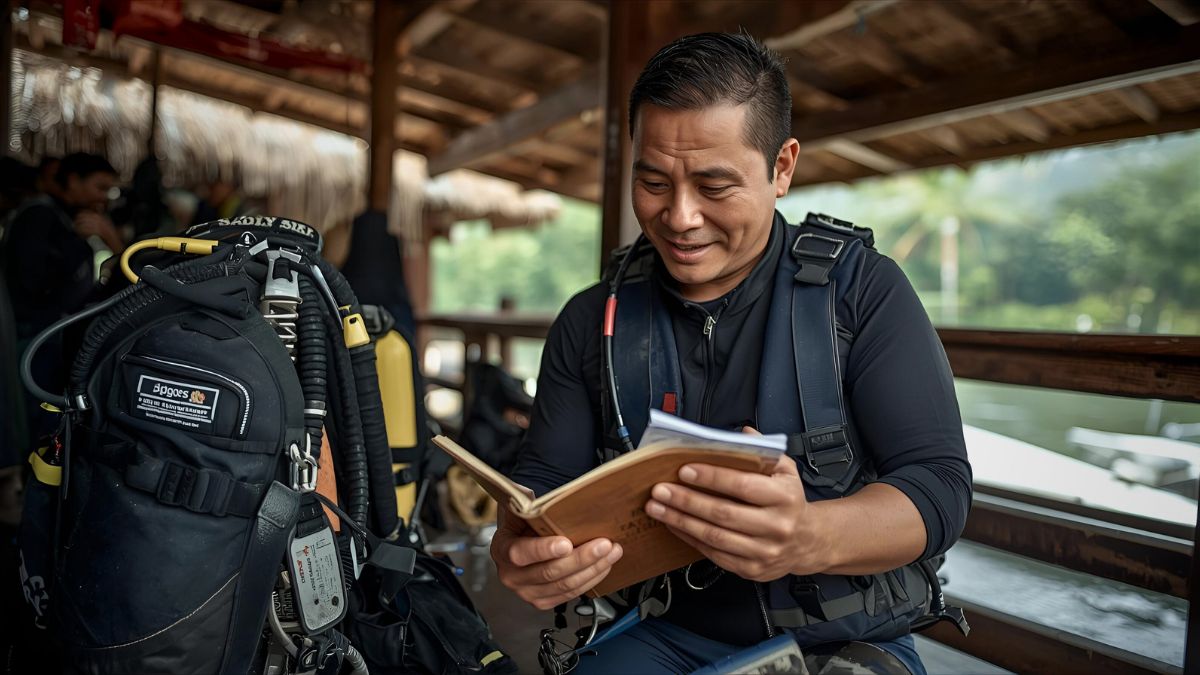
Can I Take Underwater Photos?
Underwater photography is incredibly popular. Start with simple waterproof cameras or smartphones in housings. As you gain experience, you might invest in advanced camera systems.
Photos let you share the underwater world with friends and family while leaving environments undisturbed.
What Makes Diving Memories Special?
Some of my favorite diving memories live only in my head. Swimming with a dolphin pod. A sea turtle swimming right up to my mask. The eerie beauty of exploring shipwrecks. These experiences are priceless and stay with you forever.
The underwater world is a privilege to visit, not a resource to exploit. As divers, we become ambassadors for ocean conservation. Many certified divers become passionate about protecting marine environments because they’ve witnessed the beauty firsthand.
Why Learn to Dive in Costa Rica?
Since you’re reading this on our Costa Rica dive center blog, consider why learning here is excellent.
What Makes Costa Rica Good for Learning to Dive?
Costa Rica offers ideal beginner conditions:
Is the Water Warm in Costa Rica?
Water temperatures range from 24°C to 29°C (75°F to 84°F) depending on location and season. Comfortable diving in just wetsuits, no heavy exposure suits needed.
Is the Water Clear in Costa Rica?
Visibility ranges from 10 to 30 meters at most dive sites. Clear water helps you feel comfortable and lets you see incredible marine life.
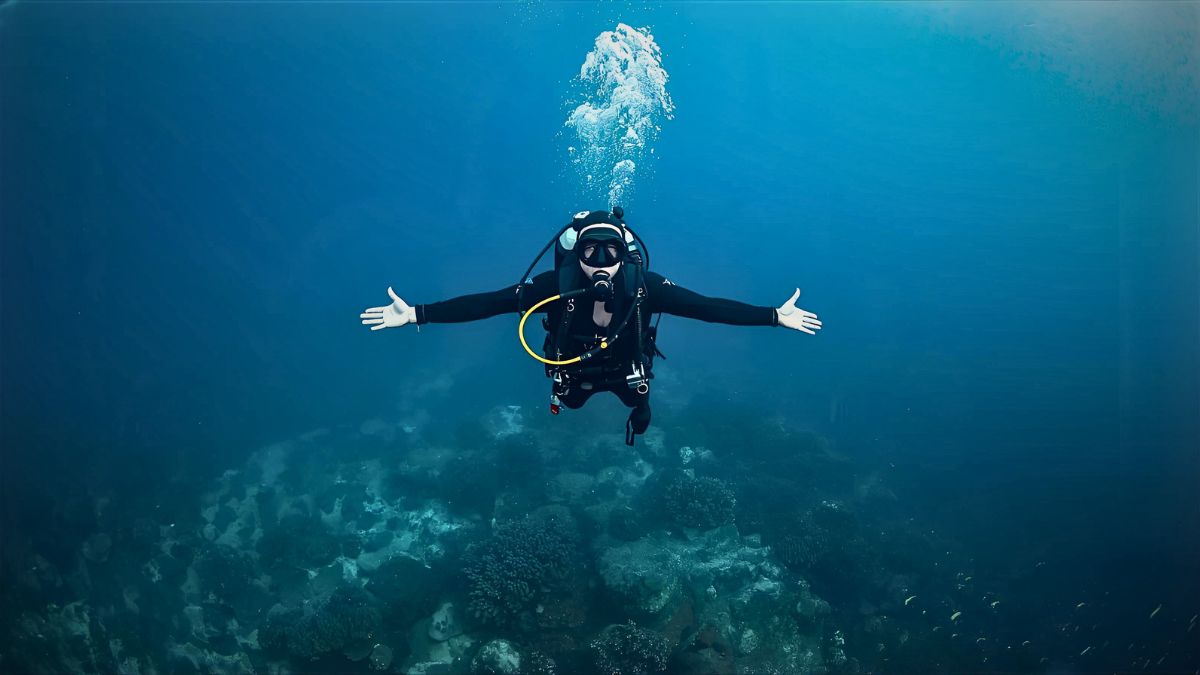
What Marine Life Will I See in Costa Rica?
Costa Rica is famous for environmental commitment and biodiversity. Underwater, you encounter manta rays, sea turtles, dolphins, several shark species, tropical reef fish, and during whale season, even humpback whales.
Are There Good Dive Sites for Beginners?
We have numerous sites perfect for new divers: calm conditions, moderate depths, stunning marine life. Caño Island and Marino Ballena National Park are two of the best learning locations.
Are Costa Rica Dive Centers Good Quality?
Costa Rica has many PADI-certified dive centers with experienced instructors. The country’s tourism infrastructure means high standards and safety protocols.
Learning to dive in a beautiful, warm-water destination like Costa Rica makes experiences more enjoyable. Instead of training in cold, murky quarries, you complete open water dives in crystal-clear tropical waters surrounded by colorful fish and coral reefs.
Can I Keep Diving After My Course in Costa Rica?
Once certified, Costa Rica offers excellent diving opportunities for practicing new skills. You can explore different sites, encounter diverse marine life, and build experience in varied conditions.
If you’re seriously considering learning to dive, check out our PADI Open Water course details or find the nearest dive shop if you’re not in Costa Rica.
How to Start Scuba Diving? Your Adventure Starts Here
Learning how to start diving is simpler than most people think. Yes, it requires time, effort, and financial investment. But the rewards far outweigh costs.
After years of teaching, I know this: almost everyone completing diving certification calls it one of the best decisions they ever made. Diving opens a new world, literally. You see things most people never experience. You challenge yourself and build confidence. You join a global community of underwater explorers.
Ready to start your diving adventure? Contact us to learn about our PADI courses in Costa Rica, or book a Discover Scuba Diving experience to try diving before committing to full certification. Once you take that first breath underwater, you’ll understand why millions worldwide have fallen in love with scuba diving.
See you underwater!
